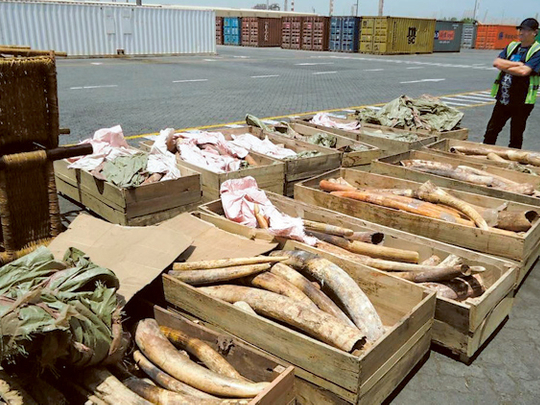
Dubai: The Ministry of Environment and Water seized a shipment from Africa containing 259 pieces of ivory.
The shipment, coming through Jebel Ali port from an unspecified African country, was seized in cooperation with Dubai Customs, who suspected and inspected the package and then referred it to the ministry.
Sultan Alwan, Assistant Undersecretary for external audit at the ministry, said that the pieces of ivory were concealed as a furniture shipment.
He said that further inspection carried out by the ministry’s technicians revealed that it contained 259 pieces of ivory from the African elephant, an animal listed in the first appendix of the Convention on International Trade in Endangered Species of Wild Fauna and Flora (CITES).
He added that it is illegal to trade in ivory, as per Federal Law No 11 of 2002 pertaining to Cites convention, which the UAE ratified in 1990.
Al Alwan stressed the ministry’s commitment to abide by the CITES agreement, and pointed out that hunting elephants for their ivory has led to a sharp decline in the animal’s population.
He praised the level of cooperation between the ministry and Dubai Customs in various fields, most importantly, on regulation of fauna and wildlife consignments coming to the UAE.
This latest seizure of elephant tusks is the second since November 2012 when Dubai customs intercepted a shipment of 215 elephant tusks worth an estimated $4 million (Dh14.68 million) and en route from Kenya to Hong Kong. The tusks were seized at the time after being discovered in bags marked as red beans.
News of the latest seizure comes only days after a new environmental campaign was launched on May 17 by the Dubai Police General Command, represented at the General Administration of Airport Security and in cooperation with the International Fund for Animal Welfare Dubai.
The new campaign is part of an ongoing bid by Dubai authorities to stem illegal shipment of elephant tusks from Africa to the Far East.
Despite an international ban on the tusk trade in a 1989 decision, poachers continue to decimate herds of wild elephants in Africa.
Execution by high-powered rifles is an oft-used method and carcasses are left to rot in the wild after the huge tusks are cut from the dead animals and sold on the international black market.












